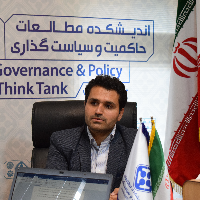Turkey?s Foreign Policy toward Central Eurasia; Energy Diplomacy Approach Regional Sphere (2002-2014)
Article Type:
Research/Original Article (دارای رتبه معتبر)
Abstract:
Turkey's foreign policy was initially formed based on non-interference in the internal affairs of its neighborhood countries and the periphery region. However, after the end of the Cold War and the collapse of the Soviet Union, and consequently the emergence of developments such as the new republics in Central Asia, the expansion of the idea of democracy and the change in the security balance of the region, the foreign policy of Turkey changed. As a result, peripheral regions such as Eurasia, which were previously not in the top priority of Turkish foreign policy, found a special role in the country's diplomatic relations.
The development of Turkish foreign policy has been so dramatic that some have called it the new Turkey. The new foreign policy, the architect of which is Ahmet Davutoglu, is based on two principles, “Zero problems with neighbors” and “Maximum cooperation.” In the new Turkish foreign policy doctrine, foreign policy officials believe that Turkey has strategic depth due to its geographic and historical location. For this reason, it should be ranked as a unique country and be considered a central power. The doctrine believes that Turkey should take the lead in its peripheral regions and gain its strategic global significance. Therefore, Turkey must establish friendly relations with its neighbors and resolve its differences with them. Turkey's most important goal in this framework is to achieve the highest degree of convergence and cooperation with its neighbors.
One of the most important peripheries in Turkish foreign policy after the collapse of the Soviet Union is the Central Eurasia region. An overview of Turkey's foreign policy in the first decade after the collapse of the Soviet Union shows that its foreign policy was based on the cultural and ideological policies towards the Central Eurasia region. But after the Justice and Development Party, which played a significant role in improving the Turkish economy, economic issues became the top priority of its foreign policy. In this regard, Turkey's competitive foreign policy (ideological competition with the countries of the region, including Russia, Georgia, and Armenia) has changed to cooperation with its neighbors. The main question of the article is, what was the most important economic factor affecting the activation of Turkey's foreign policy towards the Eurasian region after the rise of the Justice and Development Party? The hypothesis is that some issues related to the energy sector, such as providing energy needs, turning to be corridors, energy hubs, and energy security, have been the most important factors in taking Turkey's active orientation towards Central Eurasia.
This article, by using the regionalism approach, analyzes Turkey's foreign policy toward the Eurasian region. We can divide the regionalism of Turkey's foreign policy in different periods. In the first period that included the term of Kamal Ataturk's Presidency (1923-1939), Turkish foreign policy followed the principle of the traditional balance of power-peace, peace at home, peace in the world. In the second period (after World War II until the collapse of the Soviet Union) membership of the Council of Europe (1949) and NATO (1959) and ensuring the security of the West in the region was the main concern of Turkey’s foreign policy. Under these conditions, the main objectives of Turkish foreign policy, as well securing the West, was to confront the danger and influence of communism and maintain Israel's security. The third period of regionalism in Turkish foreign policy has continued since the collapse of the Soviet Union. Under this condition, the Eurasian region that has an important strategic and geopolitical role in energy, has become attractive for Ankara officials.
On the one hand the strategic role of Eurasia and the shortage of energy resources in Turkey and the increasing oil and gas consumption in this country, has made this region more important for turkeys officials.
There are some parameters that expose Turkey’s geopolitical and geo-economical significance in terms of Eurasian energy geopolitics.
- Turkey is located in a region that contains 71 percent of the World’s natural gas reserves and 72 percent of all oil reserves.1
- By 2012, 6-7 percent of the World’s oil demands are expected to be transported through Turkey.2
- Basic figures indicate Turkey’s significance for the Caspian Energy Basin.
- The Caspian Energy Basin contains 4 percent (200 billion barrels) of the World’s oil reserves and 5 percent (180 trillion m³) of all natural gas reserves. Therefore it is of outstanding importance.
So the targets16 of the Turkish Energy Policies can be summarized as:- To become an energy corridor (Not only between the East and West but also between the North and South).
- Utilizing its geopolitical location to become a transit country and the 4th main arterial road and to integrate with EU energy markets.
- To become an energy hub and make Ceyhan a significant port just like Amsterdam in the long term. To make Ceyhan the energy distribution center of global energy markets.
In a nutshell, Turkey’s energy strategy is aimed to cover the energy needs independently, at least on paper. The theoretical backgrounds for above mentioned targets are ready and are waiting to be practiced. As a result, we can say that the dependency in Turkish energy policies and increasing energy demands are major factor for its foreign policy toward Eurasia. Considering that Turkey has a strategic position in the transit of oil and gas resources to Europe, it can gain huge profits from the Eurasia region. Furthermore, Eurasia provides Turkey accessibility to new consumption markets; therefore, it seems Central Asia will be more important for Turkey in the future.
The development of Turkish foreign policy has been so dramatic that some have called it the new Turkey. The new foreign policy, the architect of which is Ahmet Davutoglu, is based on two principles, “Zero problems with neighbors” and “Maximum cooperation.” In the new Turkish foreign policy doctrine, foreign policy officials believe that Turkey has strategic depth due to its geographic and historical location. For this reason, it should be ranked as a unique country and be considered a central power. The doctrine believes that Turkey should take the lead in its peripheral regions and gain its strategic global significance. Therefore, Turkey must establish friendly relations with its neighbors and resolve its differences with them. Turkey's most important goal in this framework is to achieve the highest degree of convergence and cooperation with its neighbors.
One of the most important peripheries in Turkish foreign policy after the collapse of the Soviet Union is the Central Eurasia region. An overview of Turkey's foreign policy in the first decade after the collapse of the Soviet Union shows that its foreign policy was based on the cultural and ideological policies towards the Central Eurasia region. But after the Justice and Development Party, which played a significant role in improving the Turkish economy, economic issues became the top priority of its foreign policy. In this regard, Turkey's competitive foreign policy (ideological competition with the countries of the region, including Russia, Georgia, and Armenia) has changed to cooperation with its neighbors. The main question of the article is, what was the most important economic factor affecting the activation of Turkey's foreign policy towards the Eurasian region after the rise of the Justice and Development Party? The hypothesis is that some issues related to the energy sector, such as providing energy needs, turning to be corridors, energy hubs, and energy security, have been the most important factors in taking Turkey's active orientation towards Central Eurasia.
This article, by using the regionalism approach, analyzes Turkey's foreign policy toward the Eurasian region. We can divide the regionalism of Turkey's foreign policy in different periods. In the first period that included the term of Kamal Ataturk's Presidency (1923-1939), Turkish foreign policy followed the principle of the traditional balance of power-peace, peace at home, peace in the world. In the second period (after World War II until the collapse of the Soviet Union) membership of the Council of Europe (1949) and NATO (1959) and ensuring the security of the West in the region was the main concern of Turkey’s foreign policy. Under these conditions, the main objectives of Turkish foreign policy, as well securing the West, was to confront the danger and influence of communism and maintain Israel's security. The third period of regionalism in Turkish foreign policy has continued since the collapse of the Soviet Union. Under this condition, the Eurasian region that has an important strategic and geopolitical role in energy, has become attractive for Ankara officials.
On the one hand the strategic role of Eurasia and the shortage of energy resources in Turkey and the increasing oil and gas consumption in this country, has made this region more important for turkeys officials.
There are some parameters that expose Turkey’s geopolitical and geo-economical significance in terms of Eurasian energy geopolitics.
- Turkey is located in a region that contains 71 percent of the World’s natural gas reserves and 72 percent of all oil reserves.1
- By 2012, 6-7 percent of the World’s oil demands are expected to be transported through Turkey.2
- Basic figures indicate Turkey’s significance for the Caspian Energy Basin.
- The Caspian Energy Basin contains 4 percent (200 billion barrels) of the World’s oil reserves and 5 percent (180 trillion m³) of all natural gas reserves. Therefore it is of outstanding importance.
So the targets16 of the Turkish Energy Policies can be summarized as:- To become an energy corridor (Not only between the East and West but also between the North and South).
- Utilizing its geopolitical location to become a transit country and the 4th main arterial road and to integrate with EU energy markets.
- To become an energy hub and make Ceyhan a significant port just like Amsterdam in the long term. To make Ceyhan the energy distribution center of global energy markets.
In a nutshell, Turkey’s energy strategy is aimed to cover the energy needs independently, at least on paper. The theoretical backgrounds for above mentioned targets are ready and are waiting to be practiced. As a result, we can say that the dependency in Turkish energy policies and increasing energy demands are major factor for its foreign policy toward Eurasia. Considering that Turkey has a strategic position in the transit of oil and gas resources to Europe, it can gain huge profits from the Eurasia region. Furthermore, Eurasia provides Turkey accessibility to new consumption markets; therefore, it seems Central Asia will be more important for Turkey in the future.
Keywords:
Language:
Persian
Published:
Central Eurasia Studies, Volume:11 Issue: 22, 2018
Pages:
81 to 100
magiran.com/p1885285
دانلود و مطالعه متن این مقاله با یکی از روشهای زیر امکان پذیر است:
اشتراک شخصی
با عضویت و پرداخت آنلاین حق اشتراک یکساله به مبلغ 1,390,000ريال میتوانید 70 عنوان مطلب دانلود کنید!
اشتراک سازمانی
به کتابخانه دانشگاه یا محل کار خود پیشنهاد کنید تا اشتراک سازمانی این پایگاه را برای دسترسی نامحدود همه کاربران به متن مطالب تهیه نمایند!
توجه!
- حق عضویت دریافتی صرف حمایت از نشریات عضو و نگهداری، تکمیل و توسعه مگیران میشود.
- پرداخت حق اشتراک و دانلود مقالات اجازه بازنشر آن در سایر رسانههای چاپی و دیجیتال را به کاربر نمیدهد.
In order to view content subscription is required
Personal subscription
Subscribe magiran.com for 70 € euros via PayPal and download 70 articles during a year.
Organization subscription
Please contact us to subscribe your university or library for unlimited access!





